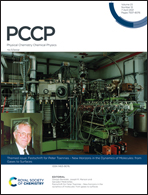Full-dimensional potential energy surface for acetylacetone and tunneling splittings†
Abstract
We present a full-dimensional potential energy surface for acetylacetone (AcAc) using full and fragmented permutationally invariant polynomial approaches. Previously reported MP2/aVTZ energies and gradients are augmented by additional calculations at this level of theory for the fits. Numerous stationary points are reported as are the usual metrics to assess the precision of the fit. The electronic barrier height for the H-atom transfer is roughly 2.2 kcal mol−1. Diffusion Monte Carlo (DMC) calculations are used to calculate the ground state wavefunction and zero-point energy of acetylacetone. These together with fixed-node DMC calculations for the first excited-state provide the predicted tunneling splitting due to the barrier to H-transfer separating two equivalent wells. Simpler 1d calculations of this splitting are also reported for varying barrier heights including the CCSD(T) barrier height of 3.2 kcal mol−1. Based on those results the DMC splitting of 160 cm−1 with a statistical uncertainty of roughly 21 cm−1, calculated using the MP2-based PES, is estimated to decrease to 100 cm−1 for a barrier of 3.2 kcal mol−1. The fragmented surface is shown to be fast to evaluate.

- This article is part of the themed collection: Festschrift for Peter Toennies - New Horizons in the Dynamics of Molecules: from Gases to Surfaces


 Please wait while we load your content...
Please wait while we load your content...
